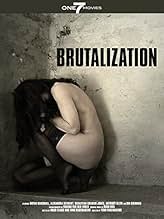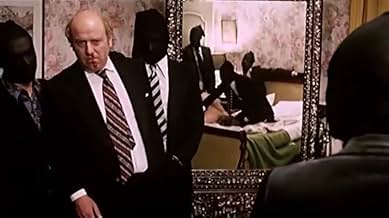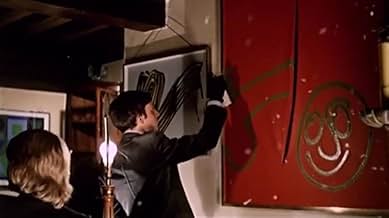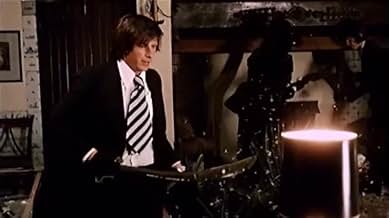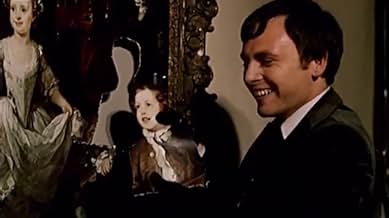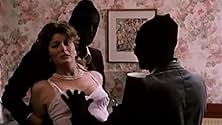अपनी भाषा में प्लॉट जोड़ेंA gang of wealthy ne'er do wells rape and terrorize women for fun and force their husbands to watch. A police detective tries to catch them, but can he break their twisted loyalty to one ano... सभी पढ़ेंA gang of wealthy ne'er do wells rape and terrorize women for fun and force their husbands to watch. A police detective tries to catch them, but can he break their twisted loyalty to one another?A gang of wealthy ne'er do wells rape and terrorize women for fun and force their husbands to watch. A police detective tries to catch them, but can he break their twisted loyalty to one another?
- निर्देशक
- लेखक
- स्टार
फ़ीचर्ड समीक्षाएं
It has been said of the 1960s, if you can remember them, you weren't really there; the same has on occasion been said of the 1970s. This film dates from 1973, and I must have been there because I watched it on Monday and didn't remember it, although shortly before he uttered them, I repeated the villain's last words verbatim – words that can't be repeated here.
I'd probably forgotten "Because Of The Cats" not because of the passage of 4 decades, but because it is such rubbish.
This is an off-beat film, even for the 1970s; the gang rape scene at the beginning is both extremely graphic and very realistic, but not really necessary; the gratuitous male nudity is inexcusable, as is the wooden dialogue. As for the terrible plot...was any police investigation in the UK, Holland or anywhere ever conducted like this? There was no DNA in the 70s, but the same cannot be said for fingerprints.
And the detective, this is not the Van De Valk I remember from the TV series. Unless you have an unhealthy fascination for pubic hair and/or male genitalia, give this one a miss.
I'd probably forgotten "Because Of The Cats" not because of the passage of 4 decades, but because it is such rubbish.
This is an off-beat film, even for the 1970s; the gang rape scene at the beginning is both extremely graphic and very realistic, but not really necessary; the gratuitous male nudity is inexcusable, as is the wooden dialogue. As for the terrible plot...was any police investigation in the UK, Holland or anywhere ever conducted like this? There was no DNA in the 70s, but the same cannot be said for fingerprints.
And the detective, this is not the Van De Valk I remember from the TV series. Unless you have an unhealthy fascination for pubic hair and/or male genitalia, give this one a miss.
In an opening scene redolent of Kubrick's A Clockwork Orange (1971), six masked youths vandalise the property of a wealthy married couple; when the owners arrive home to discover the hoodlums still at work, the husband is forced to watch as his wife is stripped and gang-raped. Uncompromising Amsterdam detective Van der Valk (Bryan Marshall) investigates the case, and comes to suspect a group of privileged teenagers called The Ravens, whose search for kicks has led them to be exploited by a Charles Manson-style svengali.
Because Of The Cats is a little sluggish at times, but its gritty realism will most likely keep fans of Euro-crime films and '70s exploitation more than happy. The initial sexual assault is graphically depicted in all of its ugliness, there's a smidgen of violence, and, with this being a Dutch film, we also get full frontal nudity from both sexes. Eagle-eyed viewers might even recognise Sylvia Kristel of Emmanuelle fame as one of the 'Cats', the elite girls who associate with The Ravens, and who provide the film with its most memorable scene, a spot of night-time skinny dipping that turns to murder.
6.5 out of 10, rounded up to 7 for IMDb.
Because Of The Cats is a little sluggish at times, but its gritty realism will most likely keep fans of Euro-crime films and '70s exploitation more than happy. The initial sexual assault is graphically depicted in all of its ugliness, there's a smidgen of violence, and, with this being a Dutch film, we also get full frontal nudity from both sexes. Eagle-eyed viewers might even recognise Sylvia Kristel of Emmanuelle fame as one of the 'Cats', the elite girls who associate with The Ravens, and who provide the film with its most memorable scene, a spot of night-time skinny dipping that turns to murder.
6.5 out of 10, rounded up to 7 for IMDb.
In what seems to almost come out of today's headlines.....a group of rich boys decide to rape and terrorize people for a goof.
They rape middle-aged women in their own house while forcing their husbands to see it all. All this while destroying their personal property. You see paintings get slashed, furniture get ripped up, and personal items smashed just for the fun of it. And these are valuable items. And the rape scenes may be hard to watch for some.
Then we get a police drama. The inspector in question targets the group for imprisonment. We see a lot of technical details about police work. Euro-flicks like to do that it seems. (Remember "Man on the Roof?") These bits almost play like a documentary.
The pace seems to get slower as we move on, but the intriguing characters keep it in focus. And the culprits are almost likable despite their sliminess.
This film is hard to find. But worth a look. The director Fons Radermakers (spelling?) later won a Foreign Film Oscar for "The Amateur."
They rape middle-aged women in their own house while forcing their husbands to see it all. All this while destroying their personal property. You see paintings get slashed, furniture get ripped up, and personal items smashed just for the fun of it. And these are valuable items. And the rape scenes may be hard to watch for some.
Then we get a police drama. The inspector in question targets the group for imprisonment. We see a lot of technical details about police work. Euro-flicks like to do that it seems. (Remember "Man on the Roof?") These bits almost play like a documentary.
The pace seems to get slower as we move on, but the intriguing characters keep it in focus. And the culprits are almost likable despite their sliminess.
This film is hard to find. But worth a look. The director Fons Radermakers (spelling?) later won a Foreign Film Oscar for "The Amateur."
Get a bunch of hormonally-stoked, wealthy, presumably-untouchable teen boys together in an iron-clad clique and let the proverbial sex and mayhem fly. Released in 1973, around the time David Hemmings had his hands full with "Unman, Wittering, & Zigo," and James Mason was dealing with "Child's Play," this youth delinquency story centers around a group of six well-to-do, but never-do-well teens who perpetrate rape and extreme vandalism. Bryan Marshall is the put-upon detective in Amsterdam who is assigned the case after a particularly graphic gang rape takes place in his metropolitan jurisdiction. All leads point to a Dutch seaside town and the six lads, who are seen as upstanding youth in the community, as the perpetrators.
The intriguing element about this otherwise slow-moving affair is the realistic bent director Fons Rademakers brings to the proceedings. The gang rape which opens the film has an air of frank reality not seen in many films during the '70s. His technique doesn't excuse the horrifying nature of the moment by using quick-cut editing, or slashing guitars on the soundtrack, or wild lighting and intense close-ups, all of which would be the way most commercial-driven directors of today would handle this sickly scene. We are forced to watch, along with the victim's husband, as she is taken by five of the six members of the gang. The vision of her just watching her husband with disgust is a hard image to shake.
Rademakers introduces naturalistic elements like this throughout. An interrogation scene of the boys' girlfriends by Marshall (which includes the barely-on-screen presence of Sylvia Kristel) is handled with nuance usually reserved for Hollywood A-type dramas. The natural, everyday-life approach to dressing and undressing (Marshall is seen full frontal, as is his prostitute girlfriend, the entrancing Alexandra Stewart)is executed in a manner completely devoid of any awareness of the camera. A Harrison Ford or Ben Affleck will always take care to cover their privates in a "bedroom" scene with a sheet or a back turn just at the right moment, which immediately makes an audience remove themselves from the story, thinking, "oh, that's right, he's a star; he doesn't want his ding-a-ling to show." Here, it's not cinema verite, but it is just natural.
Even though Marshall's not shy about revealing his shortcomings, it can also be noted he isn't shy about showing much range in his acting abilities. Both he and the criminal lads display a woefully limited amount of acting chops. On the other hand, the women in this film emote a more believable and compelling performance.
Unfortunately, the music score is oftentimes obnoxiously introduced. It sounds like the same cue is dropped in at varying points of transition without any thought of its dramatic effect or variance in rhythm or pitch on the scenes. It's quite distracting from any drama being built up on the screen by Rademakers.
Overall, the mystery of the story, which centers around a cult-like devotion amongst the boys, doesn't lend any surprises nor any suspense-filled moments. It's fairly threadbare. But the naturalness of certain scenes mentioned before, make it a step above the usual Euro-low-budget fare of the '70s. It's a naturalness like fellow Dutchman Verhoven exhibited in "Turkish Delight" and "Keetje Tippel", but without his over-the-top shock values. My rating ** out of ****.
The intriguing element about this otherwise slow-moving affair is the realistic bent director Fons Rademakers brings to the proceedings. The gang rape which opens the film has an air of frank reality not seen in many films during the '70s. His technique doesn't excuse the horrifying nature of the moment by using quick-cut editing, or slashing guitars on the soundtrack, or wild lighting and intense close-ups, all of which would be the way most commercial-driven directors of today would handle this sickly scene. We are forced to watch, along with the victim's husband, as she is taken by five of the six members of the gang. The vision of her just watching her husband with disgust is a hard image to shake.
Rademakers introduces naturalistic elements like this throughout. An interrogation scene of the boys' girlfriends by Marshall (which includes the barely-on-screen presence of Sylvia Kristel) is handled with nuance usually reserved for Hollywood A-type dramas. The natural, everyday-life approach to dressing and undressing (Marshall is seen full frontal, as is his prostitute girlfriend, the entrancing Alexandra Stewart)is executed in a manner completely devoid of any awareness of the camera. A Harrison Ford or Ben Affleck will always take care to cover their privates in a "bedroom" scene with a sheet or a back turn just at the right moment, which immediately makes an audience remove themselves from the story, thinking, "oh, that's right, he's a star; he doesn't want his ding-a-ling to show." Here, it's not cinema verite, but it is just natural.
Even though Marshall's not shy about revealing his shortcomings, it can also be noted he isn't shy about showing much range in his acting abilities. Both he and the criminal lads display a woefully limited amount of acting chops. On the other hand, the women in this film emote a more believable and compelling performance.
Unfortunately, the music score is oftentimes obnoxiously introduced. It sounds like the same cue is dropped in at varying points of transition without any thought of its dramatic effect or variance in rhythm or pitch on the scenes. It's quite distracting from any drama being built up on the screen by Rademakers.
Overall, the mystery of the story, which centers around a cult-like devotion amongst the boys, doesn't lend any surprises nor any suspense-filled moments. It's fairly threadbare. But the naturalness of certain scenes mentioned before, make it a step above the usual Euro-low-budget fare of the '70s. It's a naturalness like fellow Dutchman Verhoven exhibited in "Turkish Delight" and "Keetje Tippel", but without his over-the-top shock values. My rating ** out of ****.
This is a rather good drama, very much of its time, that begins with a graphic gang rape, becomes a meandering cop story before hurtling us into the sex and violence underbelly of communes cum cults cum dogmatic nihilism. For the most part naturalistic and frank, which in part means we get the cop full frontal as well as all the girls (including a very early appearance from Sylvia Kristel) but also a feeling that we are witnessing nothing too forced. Only the later glimpses of the darker activities with the psychedelic edge hint at anything particularly stylish, but the film is none the worse for that. All performances are fine and even the scenes with the 'posh' kids and their parents are well done. A film that could not be made today and an intelligent look at counter culture of the day.
क्या आपको पता है
- ट्रिवियाFilm debut of Sylvia Kristel.
- इसके अलावा अन्य वर्जनOriginally released in the U.S. with an "X" rating from the MPAA, in 1974 the film was edited and this version received a rating of "R".
- कनेक्शनFeatured in Underwater Nude Scenes (2016)
टॉप पसंद
रेटिंग देने के लिए साइन-इन करें और वैयक्तिकृत सुझावों के लिए वॉचलिस्ट करें
- How long is Because of the Cats?Alexa द्वारा संचालित
विवरण
बॉक्स ऑफ़िस
- बजट
- NLG 12,00,000(अनुमानित)
- चलने की अवधि
- 1 घं 38 मि(98 min)
- ध्वनि मिश्रण
- पक्ष अनुपात
- 2.35 : 1
इस पेज में योगदान दें
किसी बदलाव का सुझाव दें या अनुपलब्ध कॉन्टेंट जोड़ें


